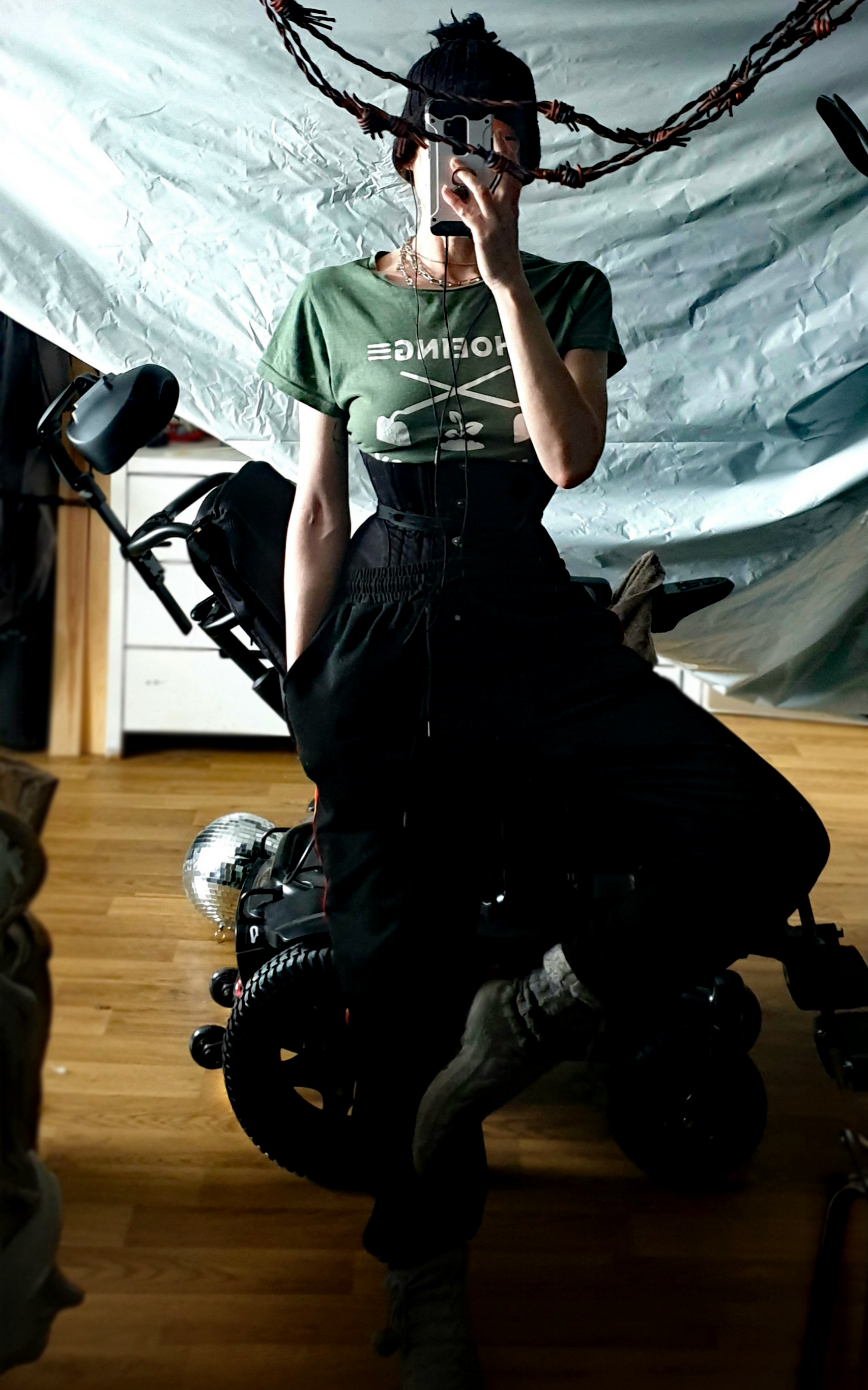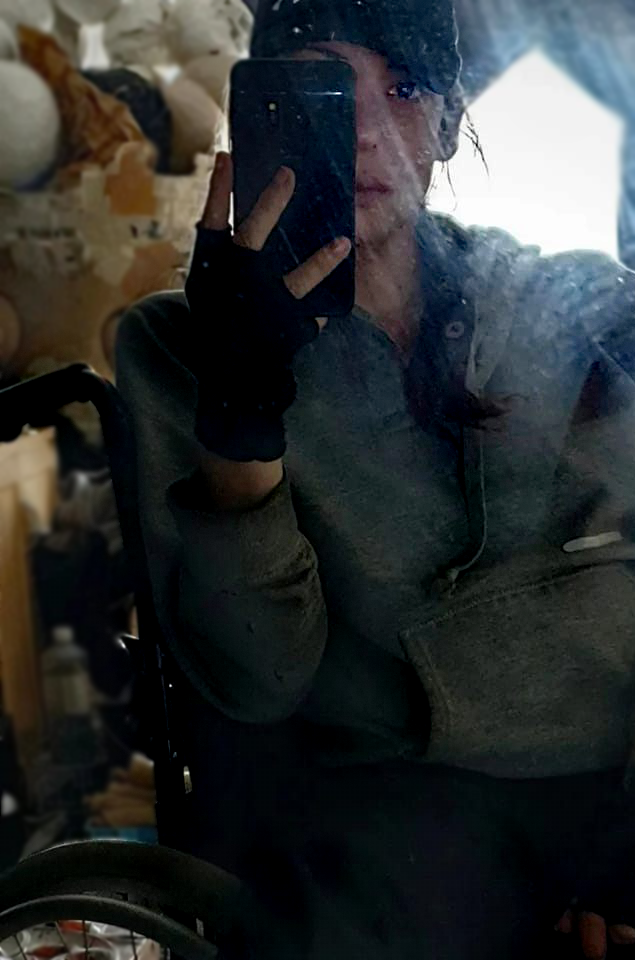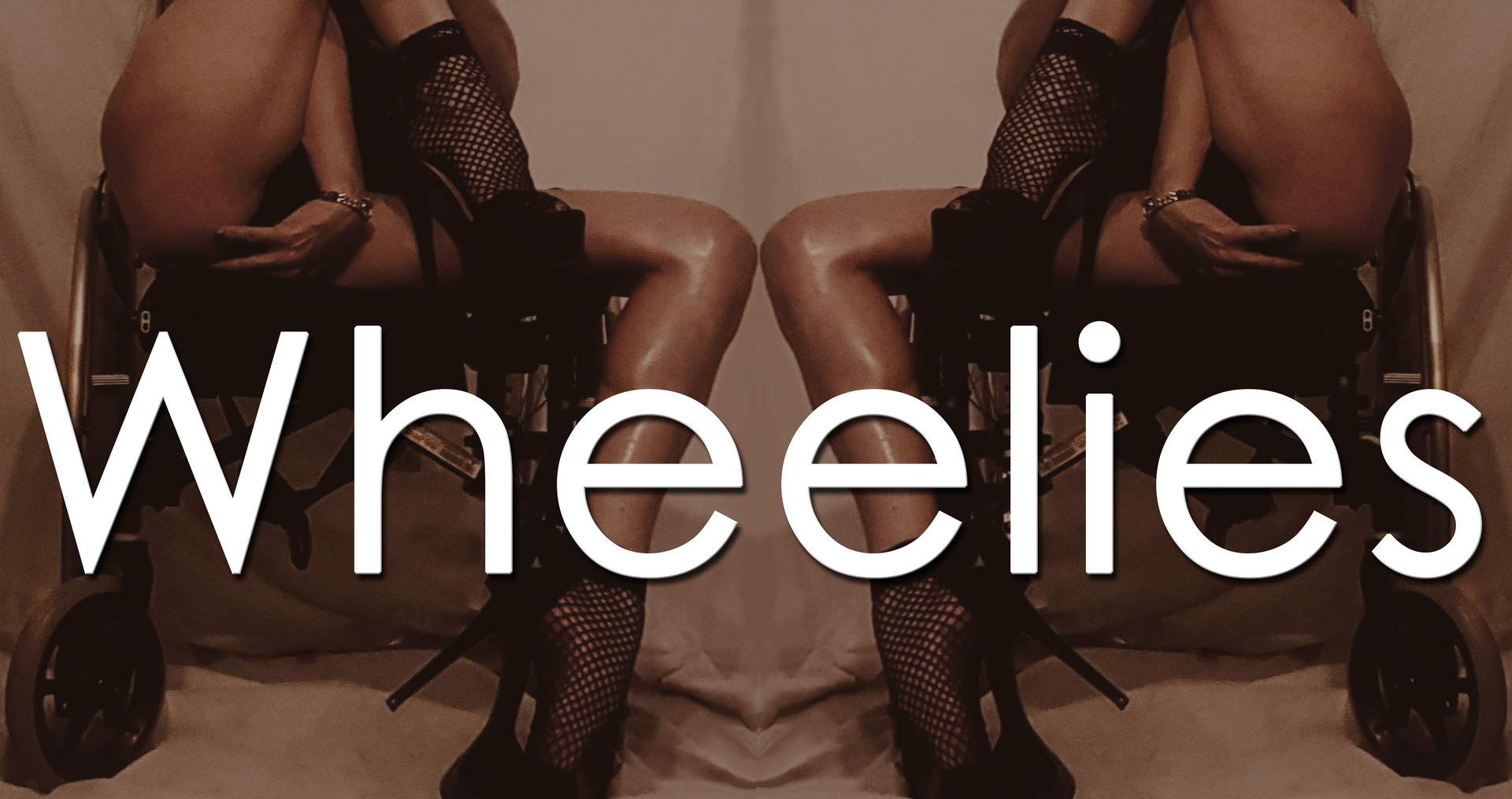Wheelies
Admitting to yourself that you need to use a wheelchair is not easy, and when you do, your very fabric as a human being can start to unravel.
Most of us with Ehlers-Danlos Syndrome (EDS) have battled long and hard with the apparent invisibility of the syndrome.
The Enemy Within
I say apparent, because if you know what to look for - lots of scars, a lack of ear lobes, extra-stretchy skin and hypermobile joints that make people gasp and look away when bent to their full extent - EDS is very visible.
Many of us have tried desperately to get doctors, friends and even family to understand our problems and pain. But once we're in a wheelchair, the focus of that fight can change. No longer are we attempting to get people to see our struggles, we are, instead, faced with getting folks to see beyond them.
Sometimes we can be our own worst enemy. The psychological impact of needing a wheelchair can be huge. Even though mobility may have been difficult (impossible at times), admitting to ourselves that we need a wheelchair is admitting to ourselves that we are dis-abled. Seeing ourselves as such can be hard and it's easy to feel defeated, to feel that EDS (or whatever immobilising illness you have) has 'won'.
We can feel like we no longer have control over our bodies or our destiny - when the truth is nobody, ill or not, is really in control of their physical form or future.
Yes, we can give ourselves a better chance of achieving longevity by sticking to healthy foods, avoiding unhealthy habits, exercising and getting a decent amount of sleep, but none of us are truly in charge of our body. Ultimately, our genes and luck play a huge part on how our health progresses.
By being reluctant to use wheelchairs and the 'disabled' label, are we not guilty of the kind of discrimination and lack of understanding that the EDS and other illness communities rally against?
Saying to ourselves that we need a wheelchair isn't about defeat and helplessness. It's accepting our bodies and controlling our mobility as best we can.
Using a wheelchair won't change our lives overnight. It will, though, give us more mobility and hopefully less pain.
When we're over the internal hurdle of using a wheelchair, we have to face the reactions of people in our life and the public - which can both be a 'biggy'.
Stigma
So, you're ready for a set of wheels, but your friends and family may not be. "Do you really need this?" is not an uncommon question from your companion as they struggle to load your chair into their hatchback.
"Of course I do, and I'd give you a hand if I wasn't going to dislocate it!" You want to scream in reply.
Sometimes their lack of belief is because they don't want us to need it, unable to face that our bodies are letting us down and illustrating their disability in dealing with our chronic conditions.
You've got to feel sorry for them, really...
That question, though, is laden with the implication that we are lying. It suggests that we're not being honest and that we are, for some reason, making up our need for wheels.
That is insulting.
While there are individuals with Munchausen Syndrome, a serious psychological condition where sufferers invent and lie about symptoms, and may even self-harm in their pursuit of the attention of medical professionals, EDS is very real - as are its impacts. Too many of us are accused of 'doctor-chasing' by ignorant medics who know less about EDS and its associated conditions than we do.

The last thing we need or deserve is loved-ones to express doubt and disbelief too. Coping with comments from those close to us is bad enough.
Strangers, though, can be even more cruel and thoughtless.
In The Social Psychology Of Stigma, Todd Heatherton et al detail the significance and damage of stigmatization.
They call it a 'challenge to one's humanity [involving] dehumanisation, threat, aversion and sometimes depersonalisation. [It] is damaging personally, interpersonally and socially costly'.
Even in 2025, the stigma attached to wheelchair users still exists and is, arguably, worsening given that ableism is on the increase - as I'll explore and show in future pieces.
By denying ourselves the use of wheelchairs when we really need one, we allow that stigma to continue and may, in some respects, be perpetuating it.
It's not just undisabled individuals who discriminate, though.
The response from other wheelchair users can be despicable.
I started using wheelchairs (I have a manual one and an electric one) because of an incident that involved a dislocating left ankle, a ditch and me doing box splits box in 2006.
Because I can stand and walk (a little and not every day) and because I don't 'look disabled' - that old peach! - other wheelchair users have made negative comments which they have later retracted with an apology after receiving a detail account of EDS, my other conditions, the fall and the lack of appropriate medical care from and illegal decisions made by my NHS Trust.
So, you see, it's not just the undisabled who can make us feel marginalised.
We face discrimination on both sides.
Ableist Britain
Once we've overcome any personal doubts and demons regarding using wheels, and after surviving certain kinds of comments from those around us, we're then faced with the struggles of existing and operating in a fundamentally ableist society that still isn't set up for wheelchair users.
Even simple things can be difficult for us.
Pavements can have uneven and patchy surfaces or be built at an angle sloped towards the road for rain to run off them which makes self-propelling difficult. Dropped kerbs put in place for cars to be parked in driveways can mean we lose control of our chairs as not all wheels touch the ground and we are thrown out into the road.
Despite certain UK laws existing as per the Equality Act 2010, many businesses still do not make reasonable adjustments to their entrances, meaning wheelchair users are locked out of their premises. Many companies running holiday businesses have huts and chalets that break the law in this respect too. Changing this and not breaking the law needn't be complex or costly.
Bringing up the fact that businesses are breaking the law, though, can be met with much hostility and criticism.
Bringing up that businesses are breaking the law in this respect, though, can be met met with much hostility and criticism - as I found out in a local town's Facebook group.
I received a number of angry comments for just stating the fact that a business that posted a photo of it's inaccessible (but easily and cheaply adapted) entrance was not acting legally.
Welcome to ableism in action.
Finding wheelchair-friendly accommodation can be next to impossible due to a dire shortage of accessible properties.
In 2018, for example, my son and I were fourteen days away from homelessness when, fortunately, the only accessible bungalow in the area became available.
The bungalow I have only exists because the woman who lived here before me fought hard to get it built. Luckily for us, she moved out and we were able to move in.
The alternative?
"We can put you in a homeless shelter," I was told by the Housing Association who operates in this area, "but your son won't be able to live there with you and it won't be wheelchair accessible, so you'll just have to move in and you won't be able to leave in your wheelchair until we find you somewhere to live or until a bungalow is built for you."
'How long will that take?" I asked, horrified.
"It could take years," was the reply.
Words I'll never forget.
Other issues exist too. There are no wheelchair accessible taxis in my area.
If I want to get out of this village with my chair, I have to use buses. They are bumpy though - often too bumpy and painful for my body to tolerate. If someone has parked a pushchair in the space for wheelchairs, it can lead to an argument when they're refusing to unload their child and fold it up.
My local railway station only became safely accessible last year. Until then, if you needed to travel in one direction, we had to cross the train tracks. Often, trains here are only made up of two carriages, meaning they can become packed so many passengers, I would struggle to get my electric wheelchair onboard.
When it came to voting in the last UK general election, I had just assumed that my local polling station would be wheelchair accessible.
Why wouldn't I?
On the say, I rolled up in my electric wheelchair and saw a sign saying 'Wheelchair Access' next to a door with a ramp. However, access to the accessible entrance was blocked by one of the building's open gates. I got out of my chair and tried to move it, but it was too firmly stuck in place to shift.
Fortunately, I was able to manage the steps up to the main entrance and once inside, I informed the staff of the issue.
One of them did go outside to try to remedy the situation, but they couldn't move the gate either. So anyone in a wheelchair who can't get out of it, or any of the village's many elderly residents who rely on walking frames who can't manage steps would not have been able to vote.
I filmed the issue. Posted it on my personal YouTube channel and it's had over eleven thousand views. It's also received many comments. I haven't read them all - I'm saving that dubious pleasure for when I start working on an editorial special about ableism that will run across a number of websites. I did glance at them months ago, and one stuck in my mind.
It was from an obviously ignorant and ableist individual who lacks the intelligence to understand why not having an accessible polling station is problematic. They told me I should have just 'done a postal vote'.
How could I have done so when I didn't know the polling station was inaccessible and that my local Council were breaking the law set out in the Equality Act until the day of voting?
Why should I and other people with mobility issues have to cast postal votes when the law states we have the legal right to vote in person in accessible polling stations?
Even one of the local hospitals I have to attend doesn't adhere to the law - as you can see in the photo...
Yes, using a wheelchair can free us on a personal level where our mobility is concerned, but society is also rigged against us on all fronts.
So, from pavements to polling stations, inaccessible accommodation to entering law-breaking businesses, it is difficult and be demoralising to live in an ableist system and society that still doesn't provide what it should.
While the Equality Act 2010 sounds good in theory and does exist, while its laws are not enforced, what use is it?
Thoughtless
Before the fall that put me in a wheelchair in 2006, I used to ride a pink mountain bike (with my young son in a chair on the back) around the town where I lived. It wasn't until I was in my chair I realised that I was known for that bike.
"You're the girl on that pink mountain bike," a man in his twenties said to me, a look of confusion on his face and an incredulous tone to word. "You're always on that pink mountain bike. Why aren't you on your mountain bike?"
"Because I'm in a wheelchair," was my reply.
Since then, I've been asked that question many times - especially by people who have seen me get in and out of my chairs. Allow me to give you some advice...
Don't.
Don't ask anyone in a wheelchair why they're in it.
Nobody ends up in one because of some happy event or circumstance. Chances are, a lot of emotional, if not physical, trauma, led to us needing one.
In asking us that why, you're asking us to tell you about our trauma. Very few people want to constantly discuss traumatic parts of their life, especially with stranger, so employ some intelligence and just don't ask.
It's none of your business anyway.

The emotional reasons for needing a wheelchair and the ongoing ignorance of others are hard to contend with.
When I first moved to the bungalow I live in, a small group of neighbours would shout in the street that I don't need my wheels because they'd seen me move my legs.
I've been here for nearly seven years, and people still stare at me in the main street when they see me get in and out of my chairs. If I can walk a little, I'll use my manual chair, but because of my hypermobile joints, I can only push myself a short distance on the flat and I have to push it up hills.
My EDS is progressing quickly now, and this worsening means that, frustratingly, I must rely on my electric wheelchair more and more.
Strangers have seen me pushing my manual wheelchair before getting into it and made comments about me forgetting my passenger of playing about because so many people are yet to wrap their minds around the fact that not every wheelchair user is paralysed.
Over the last two decades I've been told I'm 'too young' to need a wheelchair many times, as if disability depends upon age.
Beyond the physical challenges of dealing with a fundamentally ableist social structure, coping with the attitudes of strangers, the stares, sideways glances and double-takes can be the hardest part.
We have to just do it, though.
If our bodies are dictating that they need wheels, we have to just do it. Waiting won't lessen our initial and ongoing sense of awkwardness.
Neither will it stop the public ignorance and insensitive comments.
What using a wheelchair will do, though, is help us get around more and let us speed on the downhills...
...And that's got to be better than facing
a constant uphill struggle.




